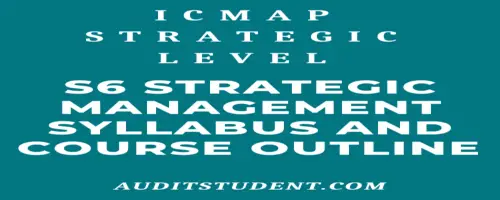Get access to latest and updated syllabus of S6 Strategic Management now. Here you will find detailed course content or Syllabus of Business Taxation for upcoming attempt.
Now you know what topics to study and practice .The next step would be to download the latest official Strategic Management Study Text. Click
to Download.
Syllabus GRID:
Here is the grid for Syllabus of S6 Strategic Management.
| GRID | WEIGHTAGE |
| STRATEGIC MANAGEMENT AND COMPETITIVE ENVIRONMENT 1. Nature and Scope of Strategic Management 2. Strategy: Introduction, Levels and Concepts 3. General and Competitive environment | 15% |
| INTERACTING WITH THE COMPETITIVE ENVIRONMENT 4. Business strategy and strategy development 5. Stakeholders and corporate objectives | 15% |
| STRATEGY DEVELOPMENT AND STRATEGIC OPTIONS 6. Strategic decision making 7. Resource audit 8. Generic strategies 9. Directions and methods of growth 10. Evaluating strategic options 11. Strategic marketing 12. Information systems and strategy 13. Issues in strategic management | 45% |
| CHANGE MANAGEMENT 14. Organizational change 15. Implementing change | 10% |
| IMPLEMENTING STRATEGIC PLANS 16. Strategic control | 5% |
| RISK MANAGEMENT 17. Risk Management | 10% |
| TOTAL | 100% |
Detailed Syllabus Contents:
The detailed Syllabus of Strategic Management for upcoming attempt is given below.
STRATEGIC MANAGEMENT AND COMPETITIVE ENVIRONMENT
1. Nature and Scope of Strategic Management
- What is Strategic Management?
- The Characteristics of Strategic Decisions
- Strategic management Stages
- Benefits of Strategic management
2. Strategy: Introduction, Levels and Concepts
- What is strategy-background
- Planned strategies: the rational model
- Crafting emergent strategies
- Other approaches to strategy
- Strategy and structure
- Levels of strategy
a) Corporate Level Strategies
b) Business Level Strategies
c) Functional Level Strategies
- Concepts in established and emergent thinking in strategic management
- The transaction cost approach
- Mission
- Goals, aims and objectives
- Implementation
3. General and Competitive environment
- Relating the organization to its environment
- The political and legal environment
- The economic environment
- The social and cultural environment
- The technological environment
- Stakeholder goals and objectives
- The competitive advantage of a nation’s industries: Porter’s diamond model
- Competitor analysis
- Accounting for competitors
- Sources, availability and quality of a data for environmental analysis
- Information for planning and control
- Environmental information and analysis
- The competitive environment: The Five Forces by M.E Porter
- Competitive strategies
- Corporate appraisal (SWOT Analysis)
PART – B
INTERACTING WITH THE COMPETITIVE ENVIRONMENT
4. Business strategy and strategy development
- Strategic planning
- Strategic planning: the rational model
- Less formal strategic planning
- Strategy lenses
- Environmental complexity and organizations
- Resource-based strategy
- Management accounting and business strategy
- Director’s strategic roles and responsibilities
5. Stakeholders and corporate objectives
- Mission, goals and strategy
- Business goals and objectives
- The short term and long term
- Stakeholder management
- Business ethics
- Corporate social responsibility and sustainability
- Not-for-profit organizations
PART – C
STRATEGY DEVELOPMENT AND STRATEGIC OPTIONS
6. Strategic decision making
- Relating the organization to its environment
- Environmental information and analysis
- Gap analysis
- Forecasting
- Scenario planning
- Foresight
- Game theory
- Strategic intelligence
7. Resource audit
- The position audit
- Resources and limiting factors
- Converting resources: the value chain
- The supply chain
- Outputs: the product portfolio
- New products and innovation
- Benchmarking
8. Generic strategies
- Factors affecting strategic options
- Generic competitive strategic
- Using the value chain in competitive strategy
- Pricing and competition
9. Directions and methods of growth
- Product-market strategy: direction of growth
- Methods of growth
- Organic growth and in-house innovation
- Mergers and acquisitions
- Joint ventures and strategic alliances
- Divestment and rationalization
- Public and non-for-profit sectors
10. Evaluating strategic options
- Evaluating strategic options
- Strategic management accounting, DCF and investment appraisal
- Risk and cost behavior
- Decision techniques
11. Strategic marketing
- Marketing
- Service Marketing
- Marketing: products, customers and segmentation
- Customer relationship marketing and loyalty
- Reviewing the customer portfolio
- Databases and marketing
- E-marketing
12. Information systems and strategy
- Strategic information system
- Information strategy
- Information sources and management
- Information for planning and control
- Knowledge management
- Databases and models
- E-commerce
- Web 2.0 technologies and business strategy
- IT department
13. Issues in strategic management
- Managing projects
- Lean systems
- Re-engineering and innovation
- Organisation structure
PART – D
CHANGE MANAGEMENT
14. Organizational change
- Introduction to change management
- Triggers for organsational change
- Stage models of change
- Other models of managing change
- Force field analysis
- Managing resistance to change
15. Implementing change
- Types of change
- The context of change
- Culture and change
- Styles of change management
- Why change succeeds or fails
- Change and the individual
- Leading change
- Group formation and its impact on change
- Business ethics and change management
- Change in practice
- Change management and strategy implementation
Strategic control:
- Planning and control
- Inflation and NPVs
- Using contribution margin as a measure of performance
- Divisional performance: return on investment (ROI)
- Divisional performance: residual income (RI)
- Comparing profit centre performance
- Inter-firm comparisons and performance ratios
- Achieving success for the shareholder
- International subsidiaries
Risk Management
- Introduction to risk
- Methods of measuring, assessing and controlling risks
- Evaluation of risk management strategies, assessing and managing risks
- Risk Management Control and Evaluation
- Management of Financial Risks
- Credit/Counterparty risk, Market risk, Operational risk, Transaction risk, interest rate and other risks
- Case Study and Risk Management System of a Limited Company/Corporation
Focus:
syllabus of S6 Strategic Management syllabus of S6 Strategic Management syllabus of S6 Strategic Management syllabus of S6 Strategic Management syllabus of S6 Strategic Management syllabus of S6 Strategic Management